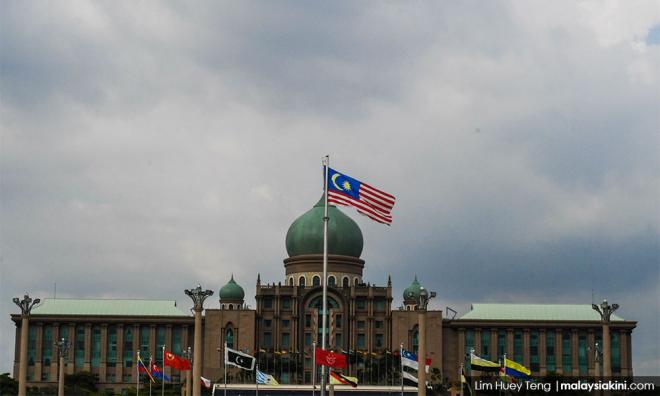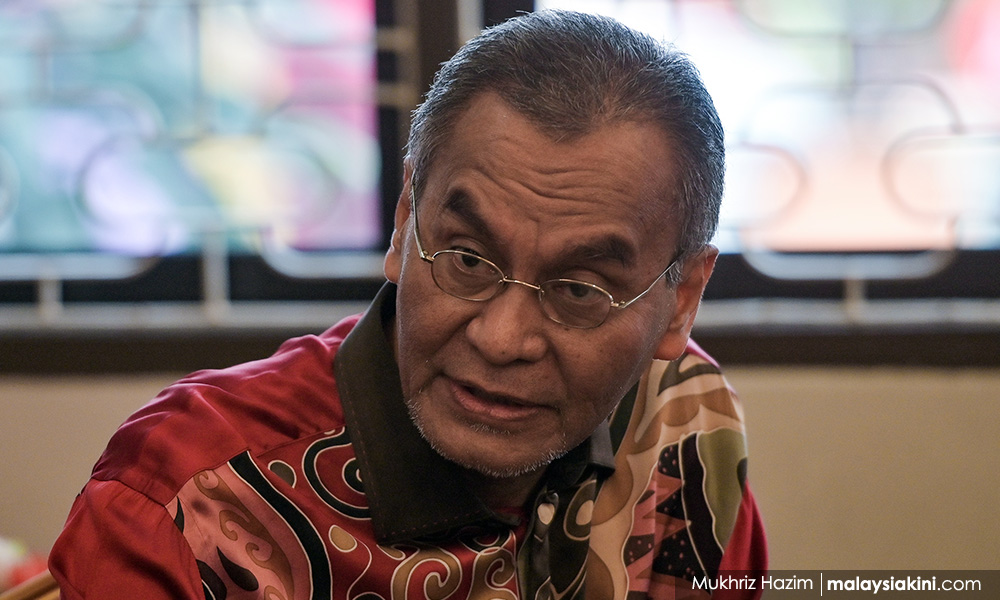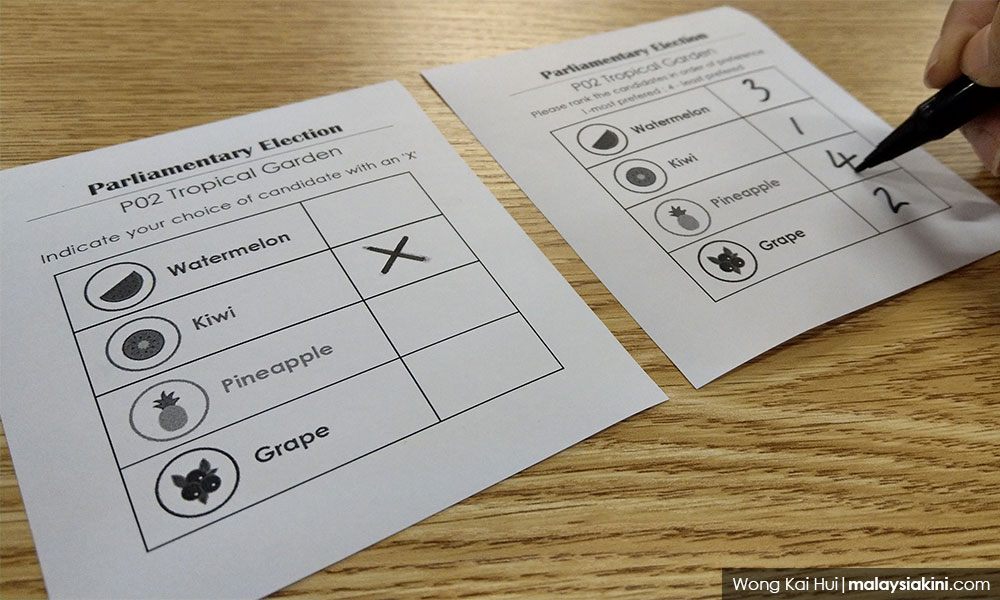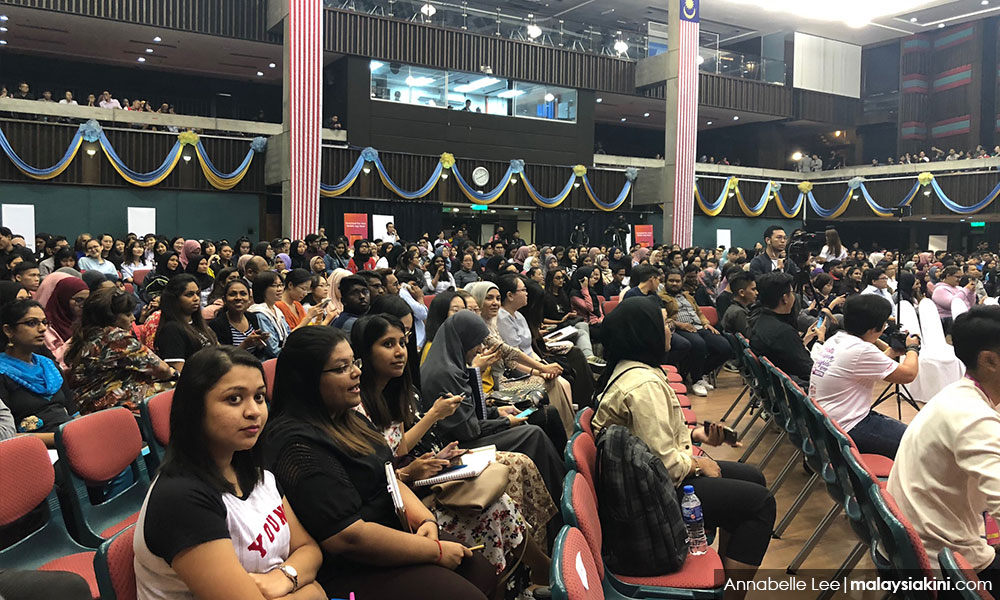Unity gov't will pave the way to a better Malaysia

Umno Youth chief Asyraf Wajdi Dusuki and Minister in the Prime Minister's Department (Economy) Mustapa Mohamed have, in recent days, called for an end to the latest cycle of intense politicking.
Asyraf and Mustapa, back in the cabinet, didn't, however, offer a means or instrument that will magically aid this whooshing.
Another minister had earlier eased into the public domain the enduring idea of springing an anti-hopping law on levitating elected representatives. Soon after, the Lubuk Antu MP bolted from PKR, a party he swiftly embraced after winning the seat in May 2018 on a different ticket.
No howling and hounding ensued. The nation has been glued to the mobile phone, rooting for, and also fearing, news on some stupendous crossovers.
"I am just preparing myself for another long political battle that will affect my business," a lady entrepreneur told this writer.
Let's hear out another personality. Amanah strategic director Dr Dzulkefly Ahmad was the serving health minister when the silent enemy, Covid19, was about to terrorise normalcy and sent us retreating into our bunkers, homes that we so cherish.

In a reflective mode, Dzulkefly (above) wrote that Pakatan Harapan personalities have been spared a merciless hounding had they stayed on as cabinet ministers throughout the Covid-19 lockdown. During Harapan's tenure, they were indeed pilloried as the polarisation machination was ramped up in tandem with the historic defeat of Umno-BN.
In truth, the pattern of inflamed politics resembles not a mere cycle, it characterises an entire era.
This may prove disconcerting to most Malaysians. Our democracy is evolving, maturing even, only excruciatingly so.
Remember the 2005 unsheathing of a keris by a scion of Umno founding president Onn Jaafar? It was as if a confident Melayu Baru circa 1993, straddling the world, had retreated to shore up the ketuanan Melayu (Malay supremacy).
This particular debate is harrowing. Ketuanan Melayu relates to Malay empowerment, about a race finding their footing after centuries of subjugation. It is a self-motivational theme aimed not at suppressing other Malaysians.
Admittedly, the keris incident was a bad illustration of ketuanan Melayu, at a time when the national conversation was inspiring (or agitating) a rise in participants. Anyone with a view could spit them out as the comfort of anonymity was extended across the online sphere.
The online din has not been entirely pointless. It has served as an ecosystem of watchdogs marshalling over the entire political terrain.
One wrong move will trigger a leaked document from some government entity that is sure to go viral.
The apprehensions over politics versus the economy aired by Asyraf and Mustapa, the musings of Dzulkefly, rumours of crossovers, and above all, polarisation, neatly fill a canvas that is shaped by the post-Covid19 challenge.
This is the precise moment to attempt a major rethink. We have been assaulted on several fronts from health to politics to business. It is time to confront our troubles.
One prognosis is fairly straightforward. The Malay political class during the triumphant Umno era cultivated strong support bases. Anyone with extensive grassroots support was always going to have a better chance at the much-anticipated party polls.
These support bases saw themselves as professional, paid loyalists. While this is already changing somewhat, the old warlords are around still. So, the nation will have to step in to calmly address this. Fuelled by ambitions and money, bad politicians could always be dressed up with a fine sheen.

Take another quick example. The Electoral Reform Committee (ERC) will propose an institute to educate the millions of young voters who will now shape national politics.
The ERC believes politicians should be similarly educated to be accountable. Will they ever listen? Will they not turn around and tell us they have a country to run, which is why opposing Members of Parliament (MPs) must be brought over to buttress stability?
The current political impasse presents an opportunity. A swift return of Harapan with, say 120 or so MPs, will please and infuriate voluble segments in equal measure.
By extension, this PN government should not endeavour to persuade rival MPs to take a leap of faith, for it will only deepen discord. Already in the coming years, key strategists will cringe as they look back at this dishing out of appointments to government-linked companies to earn legitimacy.
To address multiple frailties at once, Malaysia needs a "super" government that draws the best talents from among serving MPs.
Politicians are inherently networkers, built to assure and assuage. Disparate persuasions have given us a bigger talent pool of politicians.
Many of the senior ones have worked with each other in the past. They must now huddle. There have been ideas about easing patronage and money politics, such as nurturing a class of professional party officials. Surely the government cannot be expected to fund party coffers.
In the meantime, a few of the old certainties have vanished. To cite one example, the old pendulum that used to vacillate between Chinese support for MCA in one election and DAP in the subsequent political contest has come to halt. DAP has been the overriding choice in successive elections.
We are now blessed, not tormented, by having a class of senior MPs who would be able to offer precious insights and perspectives. They are now kept apart in rival camps, cheered and jeered by feuding supporters.
They should brainstorm collectively in a bipartisan manner, to produce urgent solutions. The world is watching. Young Malaysians will soon pose tough questions.
In tandem with a bipartisan cabinet drawing the best talents from among serving MPs, the nation should similarly establish an effective reconciliation commission with an advisory role. This commission should look at events of the past five decades and peer into the future to fashion a formidable Malaysia.

Those millions of young voters who will dramatically ramp up the electorate from 14. 9 million to 22.5 million by 2023 don't share the misgivings and the perceived hurt inflicted on the older voters.
This deluge of the young voters will reshape the political landscape of multiple constituencies. It is pointless to be looking at seat allocations at this juncture as nobody is properly acquainted with the thought process of the young. In fact, they haven't thought through their politics.
Hopefully, this new political equation will render as unnecessary the usual race to land politically strategic cabinet posts such as the Land the Rural Development Ministry. KL/Selangor is the new heartlands where inhabitants relish the journey to the old heartlands to cast their vote.
In any case, the electoral roll has never before witnessed such a spike. The very composition of political parties may actually change over the next few years. MPs looking to keep their seats should be dazzling a national audience.
Admittedly, some cybertroopers and a number of the former MPs eyeing a quick return via snap polls will be among those bitterly resisting attempts at reconciliation and unity government ideas. The nation should not blink.
RASHID YUSOF was formerly group editor of the New Straits Times. - Mkini
✍ Credit given to the original owner of this post : ☕ Malaysians Must Know the TRUTH
🌐 Hit This Link To Find Out More On Their Articles...🏄🏻♀️ Enjoy Surfing!



















Post a Comment